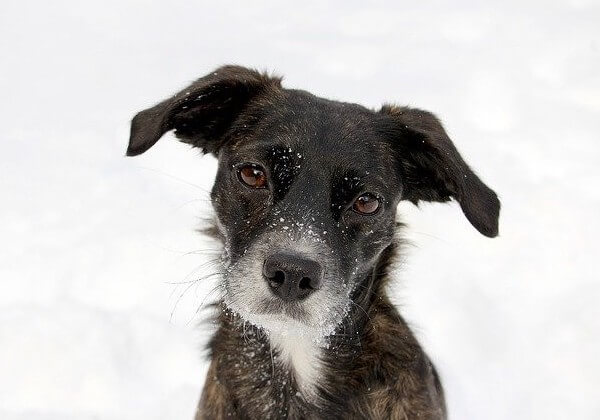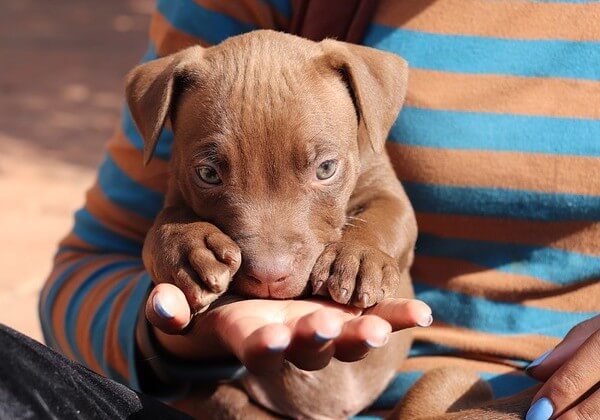
There are many health issues that both dogs and humans struggle with such as kidney failure, diabetes, anxiety, and cancer. What about Down Syndrome? Do dogs have Down Syndrome? Let’s find out!
Can dogs have Down Syndrome? No, dogs do not have Down Syndrome. While dogs and humans have several medical conditions in common, Down Syndrome isn’t one of them. Although some dogs exhibit behavioral and physical traits leading you to believe that they have Down Syndrome, the genetic conditions responsible for those are very different.
Table of Contents
Can dogs have Down Syndrome or autism?

If you’ve ever owned a canine companion, you’ve probably wondered, “can my dog have Down Syndrome? Or, what about autism?”
Dogs don’t experience Down Syndrome. Experts have never observed it among canines, and they believe it’s not likely for a dog to have this disease.
On the other hand, autism is a known canine neurological disorder. Dogs with autism have trouble following social norms, learning commands, and controlling their behavior.
Can dogs get Down Syndrome?
Down Syndrome occurs when a human fetus develops an extra set of chromosomes; more precisely, chromosome # 21. The additional chromosome set causes certain physical and mental changes in the fetus, and a human born with those features is said to have Down Syndrome.
Down Syndrome affects one in every 700 Americans. Since it isn’t a very rare illness, you might think: do dogs get Down Syndrome?
Not exactly. Although congenital disorders are prevalent among dogs, veterinary experts have never come across a dog with Down Syndrome. Some say that dogs with extra chromosomes never develop beyond the fetal stage, while others believe dogs are impervious to this condition.
The dog genome isn’t as well understood as the human genome, and the reason we haven’t come across a dog with Down Syndrome is that we probably haven’t studied their genetics as much as we have researched human genetics.
But for now, scientists believe that Down Syndrome is one genetic issue dogs don’t face.
Can a dog be Down Syndrome?
A dog with visible congenital disorders and behavioral issues may lead you to think that he or she is suffering from Down Syndrome, but these dysfunctions are not related to the disease. An extra pair of chromosomes causes Down Syndrome, and no dog has ever displayed this characteristic.
Questionable breeding of dogs, incest, and incompatible partnering have given rise to genetic issues in dogs. Shady breeders often ignore breed compatibility and the health of the offspring before partnering dogs.
Their goal is to replicate unique features and coat colors that fetch them a profit, and they aim to produce as many dogs as possible to maximize their earnings. These breeders don’t shy away from breeding dogs from the same litter, often resulting in puppies with physical and mental deformities.
Albino, merle, blue, and other rare coat colors can increase a dog’s price tenfold. Dogs with unique physical characteristics, such as the tiny size of teacup dogs, shrunk snouts of Chihuahuas and Shih Tzus, and shortened tails of Bulldogs, also fetch a higher price.
Since these traits are unnatural, they cause dogs to be born with numerous congenital issues and genetic disorders—not that different from Down Syndrome.
Can dogs have Down Syndrome symptoms?
You may be aware of some distinct signs of Down Syndrome in humans, and seeing one or more of those symptoms in your dog may prompt you to say: I think my dog has Down Syndrome.
But to be precise, those symptoms aren’t because of a chromosomal imbalance. Nevertheless, there are certain traits dogs with genetic abnormalities share with humans with Down Syndrome. We’ll discuss them in detail next.
How to tell if your dog has Down Syndrome?
Down Syndrome is a congenital disorder, meaning it develops even before birth. So how can you tell if your dog has Down Syndrome?
In humans, Down Syndrome is quite obvious. A person with this chromosomal dysfunction will experience stunted growth, cognitive impairment, flat-looking facial features, and round eyes.
It’s possible for a dog to have one or more of these features, but even then, you cannot chalk their condition up to Down Syndrome. Let’s take a look at what symptoms of Down Syndrome your dog can exhibit.
Down Syndrome dog symptoms
Although Down Syndrome is unheard of in the canine world, vets regularly observe signs of Down Syndrome in dogs. These congenital issues appear shortly after birth and may look a lot like signs your dog has Down Syndrome.
However, congenital disabilities are different from chromosomal abnormalities in how they develop, but they can still appear pretty similar. Some such symptoms are:
1. Unusual facial features
The extra chromosome in humans gives them distinct facial features. Similarly, some dogs may exhibit a snout that is too flat, eyes that aren’t balanced, teeth that are sticking out, and ears that have an odd shape. People take these features as a sign of Down Syndrome.
2. Stunted growth
Similar to how Down Syndrome stunts physical development in humans, some dogs are genetically predisposed to growth issues. All dogs grow at a predictable rate during their first year. If your pup hasn’t shown the desired growth during its first few months, consult a vet.
3. Malformed limbs
Abnormal, unequal limbs are a handicap that will trouble your dog throughout his or her life. Malformed limbs are a congenital disorder that gets passed on to future generations. It is crucial to research a dog’s parentage to ensure they don’t pass on defective genes to their offspring.
4. Vision impairment
Misshapen and asymmetric eyes can make it hard for a dog to focus or see correctly. While this condition can arise in many breeds, Chihuahuas and Shih Tzus are especially prone to eye issues. Malformed eyes can also lead to cataracts and infections, further impairing the dog’s vision.
5. Poor coordination
The cognitive dysfunction prevalent among humans with Down Syndrome often appears in dogs as well. But poor coordination or reduced brain function may not just be a genetic issue. Some dogs suffering from an ear infection, toxicity, or dehydration may temporarily lose balance and show uncoordinated movement.
6. Heart diseases
High cholesterol, poor diet, and lack of exercise can subject any dog to heart diseases, but we are talking about congenital heart diseases here. While you can prevent heart disease in healthy dogs, puppies born with heart complications aren’t that lucky.
7. Breathing problems
Some dogs suffer from breathing issues like collapsed trachea, laryngeal collapse, stenotic nares, and others. These issues are present from birth and can significantly shorten a dog’s lifespan. Dogs with misshapen snouts often experience difficulty breathing.
8. Behavioral issues
People with Down Syndrome display poor mental development; some dogs have trouble growing up mentally as well. These dogs often show unusual behavior patterns and have difficulty keeping their composure. Autism is one such genetic issue that prevents a dog from maturing mentally.
9. Disproportionate features
Symmetry is a sign of genetic fitness in dogs and humans. However, some congenital issues keep the body features from developing symmetrically. Like Down Syndrome in humans, some dogs have uneven limbs, abnormal ears, unequal eyes, and crooked features. Although such conditions aren’t always a cause for concern, some disproportionate features can keep dogs from living normal lives.
10. Hearing impairment
Deafness is another genetic condition that some dogs are more prone to than others. When breeders try to produce rare coat colors and physical traits in puppies for profit, they often ignore the health complications such puppies will carry. Hearing impairment is prevalent among dogs that suffer from congenital weakness.
11. Difficulty learning
People with Down Syndrome have difficulty performing in academics and often have a lower IQ. Some dogs also suffer from this issue as their brains never develop enough to help them learn. Such dogs won’t learn commands, social etiquette, or behavioral patterns of their canine mates.
12. Skin and coat issues
Dogs with genetic conditions sometimes suffer from hair loss, mange, skin discoloration, and skin allergies. Although these issues aren’t related to the number of chromosomes in a dog, many still consider them a sign of Down Syndrome.
Pets with Down Syndrome
It’s easy to look up pets and wild animals with “Down Syndrome” on the internet. But the truth is, Down Syndrome is a human disorder that is far more than odd facial features. Most animals that people claim to be suffering from Down Syndrome are facing some other physical deformity.
The occurrence of Down Syndrome in pet animals isn’t something medical and veterinary experts have observed. But the reason why we only see Down Syndrome in humans may be the depth of how we’ve studied human genetics.
In contrast, we have a very limited understanding of genetics, DNA, and chromosomal issues in dogs, cats, and other pets. But many dogs suffer from congenital problems that may seem like Down Syndrome. Let’s discuss some such dog breeds.
Do Bulldogs have Down Syndrome?
Bulldog Down Syndrome is perhaps not totally unheard of. After all, many people think that every Bulldog is a Down Syndrome Bulldog. But while they do suffer from numerous hereditary problems, Down Syndrome isn’t one of them.
If you’ve ever come across a bulldog with Down Syndrome, he or she is likely suffering from some other birth defect. It’s not uncommon for people to say they’ve seen French bulldogs with Down Syndrome or an English bulldog with Down Syndrome, but those are usually different genetic disorders.
A Down Syndrome French Bulldog, for instance, is called such because of its predisposition to breathing issues, eye infections, and hemivertebrae. But although these problems match those of Down Syndrome, their reasons are different. The same goes for other dog breeds.
Down Syndrome Chihuahua
Chihuahuas have a really long lifespan and can live up to 20 years. Unfortunately, they suffer from a hoard of diseases they carry from birth. Although Chihuahuas don’t get Down Syndrome, they often suffer from malformed snouts, joint issues, growth problems, and abnormal body proportions.
Down Syndrome Pitbull

Pitbulls are famous for their kind nature but notorious for their viciousness at the same time. These Pitbull dogs are pretty healthy but can suffer from genetic illnesses, mainly affecting their vision, skin, and nerves.
Down Syndrome German Shepherd
Due to their elegant and classy looks, it isn’t easy to imagine a German shepherd dog with Down Syndrome. These dogs don’t display chromosome trisomy—a genetic condition that causes Down Syndrome. However, you can still find congenital disorders in this dog breed.
Down Syndrome Husky
While huskies are a healthy breed with few health issues, they do suffer from eye diseases like cataracts, leading people to believe they can have Down Syndrome. However, as with other dogs, no one has proven a husky to have Down Syndrome.
Do Pugs have Down Syndrome?
Genetically speaking, Pugs aren’t the healthiest dog breed. These dogs get their signature punched face from generations of selective breeding. Unfortunately, this practice has made Pugs susceptible to several genetic abnormalities.
Down Syndrome in the Pug dog breed isn’t unheard of. They are predisposed to numerous infections and disorders. Pugs can pass on these issues to their offspring, but the scientific community hasn’t come across Pugs with Down Syndrome.
Boxer dog with Down Syndrome
Like Bulldogs, many people think Boxers have Down Syndrome too. But that isn’t the case. Despite their flatter snouts and a tendency for brachycephaly, these dogs are just as healthy as any other dog breed.
Shih Tzu with Down Syndrome
Shih Tzus have a fair share of birth issues that put them at risk of various health complications. Due to the similarity of these genetic disorders to Down Syndrome, Shih Tzu is often thought of like a dog with Down Syndrome. However, that is a misconception, and the genetic issues in these dogs aren’t chromosomal.
Lab with Down Syndrome
Some people confuse vision problems, joint malformation, and skin issues in the Yellow Lab with Down Syndrome. Although these conditions require veterinary care, and they can shorten your Lab’s lifespan, they’re not the same as Down Syndrome.
Golden Retriever dogs with Down Syndrome
Have you ever come across a Golden Retriever with Down Syndrome? If you have, you may be mistaking him or her for another genetic disease. Many people confuse some other genetic issue with Golden Retriever Down Syndrome, but veterinary experts have yet to come across a Down Syndrome Golden Retriever.
Rottweiler with Down Syndrome
A Down Syndrome Rottweiler may refer to a Rottweiler who shows problematic behavior or some other odd physical trait. Although these issues may seem like symptoms of Down Syndrome, they’re not related.
So, can dogs have Down Syndrome?
Fortunately, no. Dogs don’t suffer from Down Syndrome. Although your pet pooch may exhibit symptoms of Down Syndrome, those are likely due to some other congenital disorder.
Dogs with special needs warrant a bit more care and looking after, but they can be just as loving and adorable companions as other dogs.
DISCLAIMER: THIS WEBSITE DOES NOT PROVIDE MEDICAL ADVICE
The information, including but not limited to, text, graphics, images and other material contained on this website are for informational purposes only. No material on this site is intended to be a substitute for professional veterinary advice, diagnosis, or treatment. Always seek the advice of your veterinarian or other qualified health care provider with any questions you may have regarding a medical condition.
Resources:
https://en.wikipedia.org/wiki/Down_syndrome
https://www.globaldownsyndrome.org/about-down-syndrome/facts-about-down-syndrome/

With over five years of specialized experience as an animal writer, my expertise lies in dog nutrition, health, behavior, grooming, and training. I am dedicated to delivering helpful and informative content that caters to the well-being of our furry friends. My primary goal is to empower pet owners with knowledge and ensure our canine companions thrive in health and happiness. In my free time, I love volunteering at local dog rescue centers.







